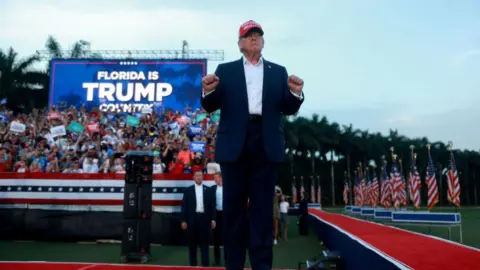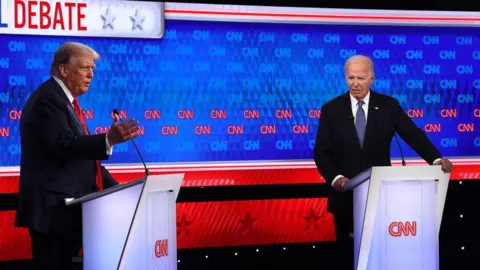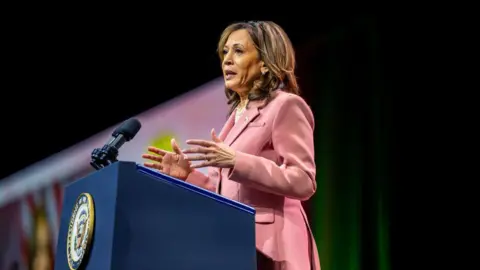By Holly Honderich, in Washington
 Getty Images
Getty ImagesAs Joe Biden attempted to calm the storm engulfing his presidential re-election campaign, he hit an early snag: referring to “Vice-President Trump” during a Thursday press conference when he meant Kamala Harris.
Within minutes, Donald Trump mocked the gaffe on his social media platform, Truth Social, with an accompanying clip. “Great job, Joe!” he wrote.
It was the kind of reaction voters have come to expect from Trump, who has spent years insulting the president, 81.
And yet, for the past two weeks, as Mr Biden was fighting for his political life, Trump remained uncharacteristically quiet, letting Democrats argue among themselves.
Republican strategists claim the relative silence is down to Trump’s new-found discipline – a change from his 2016 and 2020 campaigns.
“He’s played it brilliantly by not saying much about the Democratic crisis,” said Ron Bonjean, a Republican strategist and former senior Senate and House leadership aide. “Why take the shovel away when they’re digging their own hole?”
Trump, 78, has not gone entirely underground. Since Mr Biden’s poor debate performance in late June, Trump has given a handful of radio interviews, appeared at rallies in Virginia and Florida, and kept up a steady drumbeat of posts on Truth Social.
“The radical left Democratic party is divided in chaos,” Trump said at a Tuesday campaign rally in Miami. “They can’t decide which of their candidates is more unfit to be president, sleepy, crooked Joe Biden or laughing Kamala.”
He also challenged the president to a golf match, claimed all US airports were dirty, said that visitors to Washington DC end up “shot, mugged and raped”, claimed 45,000 people were at the Miami event when there were closer to 700, and pondered why “we don’t eat bacon anymore”.
But experts say that compared to past behaviour, the Republican has been restrained. Some have suggested Trump’s camp may even be delaying his choice for vice-president to avoid stealing attention from Mr Biden’s problems.
“If you compare this strategy and execution [in] this campaign to 2016 and 2020, it is far more strategic, far more disciplined,” said Kevin Madden, a Republican communications expert who worked on Mitt Romney’s presidential bids.
With the Democratic Party fracturing over Mr Biden’s candidacy, Corey Lewandowski, Trump’s 2016 campaign manager, said the approach taken by Trump since the debate had been effective.
“The Trump campaign has done an outstanding job of allowing the Biden campaign to self-destruct,” he said.
 Getty Images
Getty ImagesThat implosion may have been what the Trump campaign was banking on from the start. The Republican plan to win over the American people has, for a while now, leaned on voters’ well-documented fears about Mr Biden’s age.
Speaking to The Atlantic’s Tim Alberta, Trump campaign manager Chris LaCivita said he had planned for an “extraordinarily visual” match-up where Mr Biden was viewed as old and frail while Trump appeared strong and vigorous.
“The debate was exactly what they wanted,” Mr Madden said. “They got the perfect split-screen that was going to endure.”
A number of recent polls put Trump consistently – if still narrowly – ahead of Mr Biden.
But there is concern within the Trump camp that anxiety over Mr Biden’s fitness has peaked too soon.
Were he to be replaced by a younger nominee, Trump would lose two main lines of attack – age and frailty. And it would be harder to directly blame a new candidate for the president’s perceived policy failures: Mr Biden scores badly with voters on the economy and the southern border crisis.
“They’re silently hoping, with their fingers crossed, that Biden is the nominee,” said strategist Ron Bonjean of Trump’s campaign. “They feel they will win the election with Biden as their opponent.”
Some of Trump’s closest surrogates have seemed to suggest they want Mr Biden to stay on. On Thursday, while Democrats parsed the impact of the president’s defiant press conference, Trump’s son Don Jr offered rare praise.
Mr Biden’s performance had been “not too bad”, he said. “He did fine enough to be able to stay in it – he doesn’t want to go.”
Last week, Trump’s daughter-in-law and co-chair of the Republican National Committee, Lara Trump, suggested it would “go against the democratic process” if Mr Biden were to be removed.
Nevertheless, Mr Bonjean and other Republican experts made clear that if it was hard for Republicans to take on a new candidate, it would be harder still for Democrats to choose one.
 Getty Images
Getty Images“Yes, it will cause the Trump campaign to scramble a little bit. But their scrambling is not nearly what it will be for the Democrats,” said Douglas Heye, a Republican strategist who served as chief of staff to former House majority leader Eric Cantor.
“They have to figure out how to nominate somebody else… they have to build a brand-new structure from scratch.”
Meanwhile, Republicans are combing through records of Ms Harris and other possible replacements, he said. “They’re not prepared, necessarily, for this, but they are preparing.”
Next week, at the Republican party convention in Milwaukee, Wisconsin, Trump will reclaim centre stage, officially accepting his party’s nomination and making a primetime speech that will set the tone for the final months of his campaign.
Mr Heye suggested that the convention – four days of party fanfare built around a candidate who revels in the spotlight – will have made it easier to sell Trump the benefits of the strategy of remaining largely quiet.
“If you’re committed to keeping your candidate under wraps for an extended period, there has to be a pay-out later on,” he said. “His leadership can say: ‘You’ve got all of next week, it’s going to be the Donald Trump show’.”



